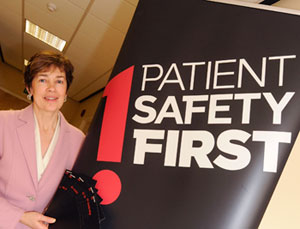 The Supreme Court recently decided, in the case of Bruesewitz v. Wyeth, that Wyeth Pharmaceuticals could not be held liable for injury to the Bruesewitz’ daughter (following a vaccination) because Wyeth was protected by the National Childhood Vaccine Injury Act.
The Supreme Court recently decided, in the case of Bruesewitz v. Wyeth, that Wyeth Pharmaceuticals could not be held liable for injury to the Bruesewitz’ daughter (following a vaccination) because Wyeth was protected by the National Childhood Vaccine Injury Act.
I was reading an article on this controversial issue in the NEJM when I was brought up short by the following sentence: (emphasis added)
Litigation such as the Bruesewitzes’ can help the FDA in its oversight function by revealing important and previously unknown information about product-related risks, especially during the postapproval period, and by deterring manufacturers from acting irresponsibly and engaging in business tactics aimed at increasing product sales at the expense of patient safety.
Now, I know corporations sometimes put profits before consumer safety (I once owned a Ford Pinto). And I know that, starting in the late 20th century, medicine became driven by corporate profits rather than traditional medical professionalism. (This is not to say that medical professionalism has disappeared. Merely that there has been a shift in values.) But it still troubles me to read a casual reference to profits being more important than patient safety. It’s an acknowledgment that such practices are an everyday occurrence, imperfectly dealt with by regulations and legislation, and are not a matter of what’s ethically right or wrong.
For-profit medicine drives increased use and costs
I believe medicine – which deals with life, death, pain, suffering, and disability – is not just another business like selling consumer goods. (See From MD to MBA: The business of primary care.) Other industries –automobiles, airlines — may need to consider life-threatening safety issues. But the primary focus of those industries is to sell a particular product or service, not to keep people alive and well.
The profit motive does not mix well with medicine. It encourages healthy individuals to become patients through the medicalization of harmless conditions and behaviors. The motivation to maximize profits — by expanding the patient population and charging what the market will bear — increases the cost of health care and threatens the economy.
If medicine was a non-profit business, individuals could still be paid well. Doctors certainly deserve to be paid well. So do their staff, along with all those who support the work of physicians and hospitals – laboratories, suppliers, manufacturers of pharmaceuticals, medical devices, diagnostic equipment. Ideally individuals in the health care industry should be so well paid that there is no motive for anyone to be corrupt or to compromise patient safety.
In his excellent documentary on the financial crisis, Inside Job, Charles Ferguson interviewed the Prime Minister of Singapore, Lee Hsien Loong. The PM readily disclosed the high salaries of individuals in his government who were responsible for the interests of consumers and the public and for the regulation of the financial industry. He also shared his belief that these generous salaries insure quality and deter corruption. That makes a great deal of sense to me.
Medicine should not favor investors over patients
What’s happened in the US is that profits from medicine have become very large, and those profits are earned by impersonal corporations, not by the individuals responsible for the well being of patients. As a result, the level or location at which ethical decisions are made is no longer where it should be.
When a doctor weighs the safety of a patient against personal financial gain, the decision will be as ethical as the individual doctor. A decision made by a group practice of primary care physicians and specialists is more complex, but the ethics of each individual is scrutinized by the group. A hospital director may need to weigh conflicting demands when making a decision, but must still live with her conscience once the decision is made. A corporate board, on the other hand — whether it governs a hospital, a pharmaceutical company or an insurance giant — is legally required to give priority to stock holders over patients.
When it comes to matters of health it seems obvious to me that corporate boards are the least desirable level at which decisions – such as to engage in a business tactic that increases product sales at the expense of patient safety — should be made.
Is there any hope that things might change? Can we imagine corporations that consider the impact of their business practices on society? Or is there no escape from a predatory capitalism focused exclusively on short-term profits.
An interesting concept discussed in the business community these days is “shared value” – the idea that ultimately it’s in the economic interest of companies to consider not only their customers, but the well being of society and the fate of the planet. The concept is very idealistic and probably not something that will happen in our lifetimes. But it’s a good start.
Related posts:
From MD to MBA: The business of primary care
Health insurance insider speaks out
Merchants of Doubt
Campaign contributions and the cost of pharmaceuticals
Resources:
Image: RD&E Hospital
Aaron Kesselheim, Safety, Supply, and Suits — Litigation and the Vaccine Industry, The New England Journal of Medicine, April 21, 2011, 364(16), pp 1485-1497
Charles Ferguson (Director), Inside Job
Michael E. Porter and Mark R. Kramer, The Big Idea: Creating Shared Value, Harvard Business Review, January-February 2011 (article is behind a paywall, but the extensive comments are not and are worth reading)


Sorry, comments are closed for this post.